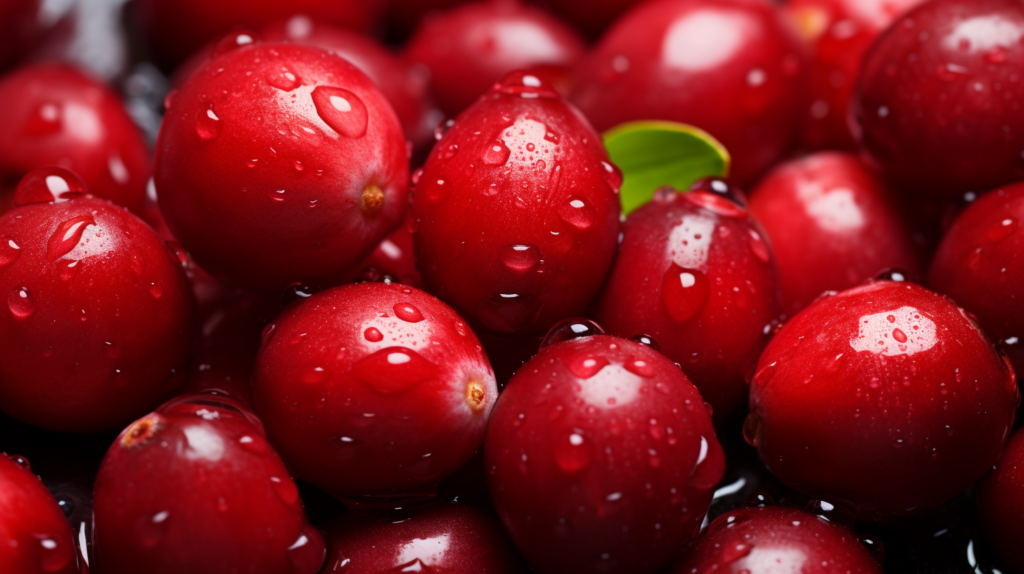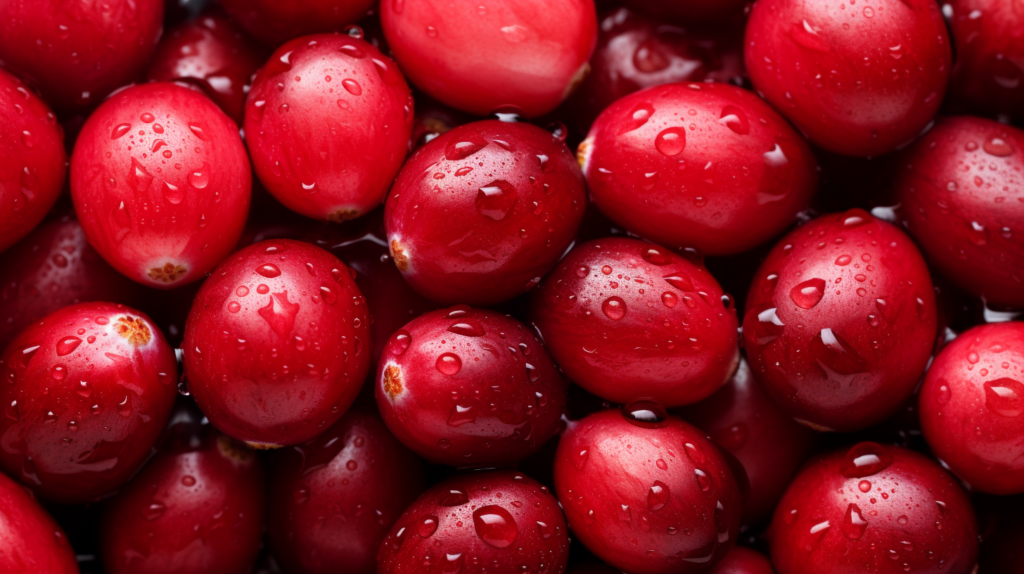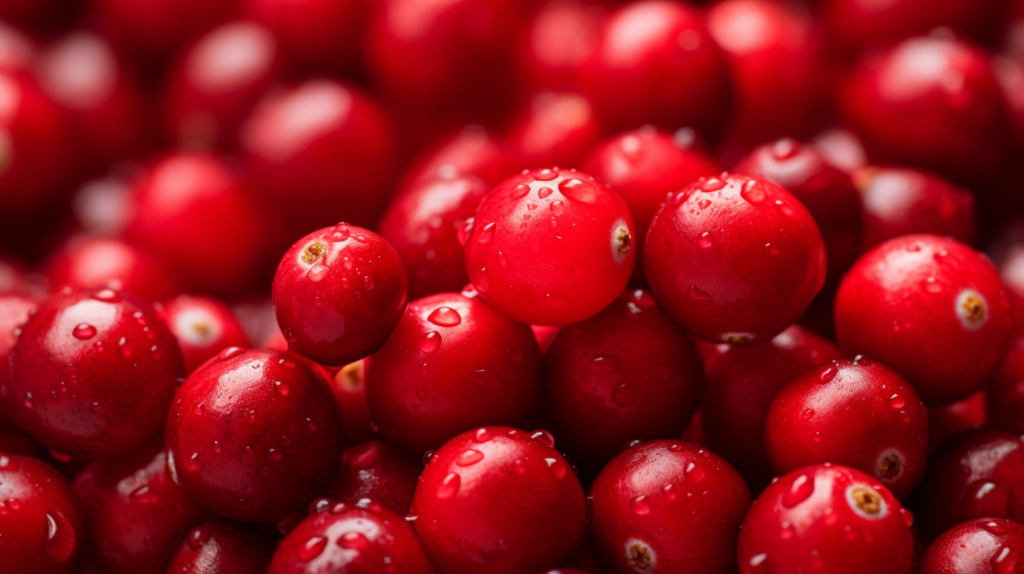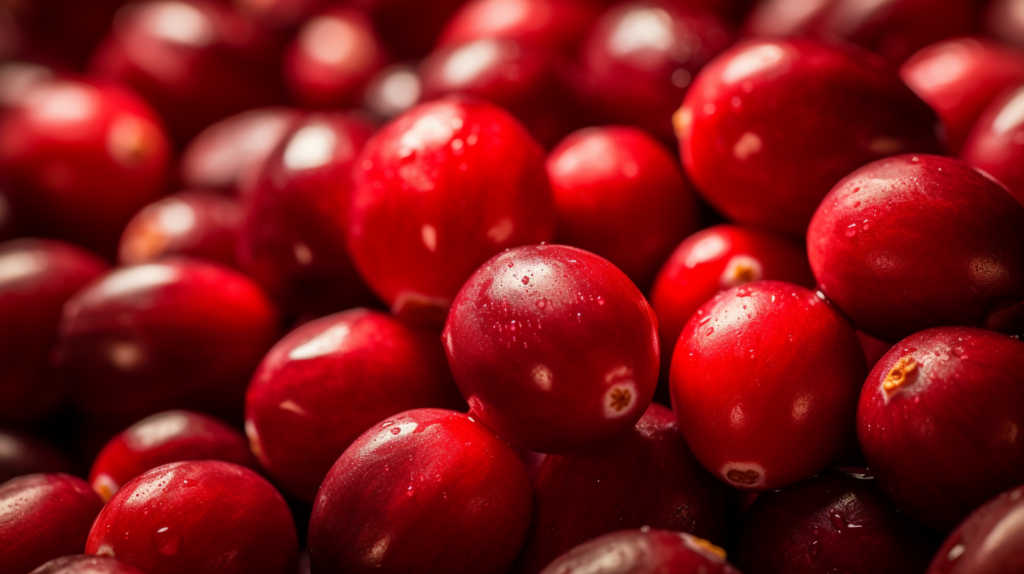If you’re looking for a delicious and natural way to boost your health, look no further than cranberries. These tart little berries are packed with nutrients and compounds that can help prevent urinary tract infections (UTIs), strengthen your immune system, and improve your overall well-being.
Cranberries are a rich source of antioxidants, phytochemicals, vitamins, and minerals that can promote health and fight disease. They can be enjoyed fresh, dried, or in juice form, making them a versatile addition to any diet. Whether you’re dealing with a specific health concern or just looking for a tasty and nutritious snack, cranberries are definitely worth considering.
Key Takeaways
- Cranberries are a natural way to prevent UTIs and boost immunity
- These berries are rich in antioxidants, phytochemicals, vitamins, and minerals
- Cranberries can be enjoyed fresh, dried, or in juice form
- Incorporating cranberries into your diet can have numerous health benefits

The Power of Cranberries in Preventing UTIs
If you’re looking for a natural way to prevent UTIs, cranberries may be the answer you’ve been searching for. Research has shown that the compounds found in cranberries can help prevent bacteria from adhering to the urinary tract walls, reducing the risk of infection.
One of the key components in cranberries for UTI prevention is proanthocyanidins (PACs), a group of antioxidants that can inhibit the adhesion of harmful bacteria such as E. coli to the urinary tract walls. In addition to preventing the bacteria from attaching to the walls, the PACs can also help flush the bacteria out of the body through urination, stopping the infection in its tracks.
While cranberry juice is a popular option for UTI prevention, it’s important to choose a variety that is low in added sugars. Drinking cranberry juice cocktails with high sugar content can actually increase the risk of bacterial growth, making the infection worse. Instead, opt for 100% pure cranberry juice or cranberry supplements that are standardized to contain at least 36 milligrams of PACs per day.
The Science Behind Cranberries and UTIs
Studies have shown that the regular consumption of cranberry products can prevent recurrent UTIs. In a randomized controlled trial published in the Journal of Urology, women who consumed cranberry juice daily for six months had a significantly lower occurrence of UTIs compared to those who received a placebo.
Another randomized controlled trial published in the Archives of Internal Medicine found that consuming cranberry capsules containing 500 milligrams of cranberry extract twice daily for six months resulted in a 50% reduction in UTI occurrence compared to the placebo group.
While cranberries can be an effective way to prevent UTIs, they should not be used as a substitute for medical treatment if you already have an infection. Always consult with a healthcare professional if you suspect you have a UTI or any other medical condition.
Incorporating Cranberries into Your Diet for UTI Prevention
To reap the UTI prevention benefits of cranberries, try incorporating them into your diet in various forms. Fresh, frozen, or dried cranberries can be added to salads, oatmeal, yogurt, or smoothies for a tart and nutritious twist. Unsweetened cranberry juice can also be used as a base for refreshing spritzers or incorporated into marinades for meat or fish.
Cranberry extract supplements are also a convenient way to ensure that you’re getting enough PACs to prevent UTIs. However, it’s important to follow the recommended dosage on the label and consult with a healthcare professional before starting any new supplement regimen.
Incorporating cranberries into your daily diet can not only help prevent UTIs, but also provide numerous other health benefits. Read on to learn more about how cranberries can enhance your overall well-being.

Strengthening Immunity with Cranberries
Cranberries aren’t just great for preventing UTIs; they’re also powerhouses when it comes to strengthening your immune system. One reason for this is their high antioxidant content.
Antioxidants are compounds that protect your body from harmful free radicals, which can cause cell damage and lead to chronic diseases. Cranberries are loaded with antioxidants, including flavonoids and phenolic acids, which help neutralize free radicals and boost your immune function.
Additionally, cranberries contain other beneficial substances that support immune health, such as vitamin C, vitamin A, and manganese. Vitamin C is a well-known immune booster that helps increase the production of white blood cells, which are responsible for fighting infections. Vitamin A is another vital nutrient for immune function that helps regulate the immune response and protect against pathogens. Manganese is a mineral that helps activate enzymes involved in immune function.
Phytochemicals are another important component of cranberries that contribute to their immune-enhancing properties. Phytochemicals are plant compounds that have various health benefits, including antioxidant, anti-inflammatory, and immune-stimulating effects. Cranberries contain several types of phytochemicals, such as proanthocyanidins and quercetin, which have been shown to enhance immune function and protect against infections.
By incorporating cranberries into your diet, you can help boost your immune system and reduce your risk of getting sick. Whether you enjoy fresh cranberries in a salad, dried cranberries in trail mix, or cranberry juice in a smoothie, you’ll be reaping the benefits of this incredibly nutritious and versatile fruit.

Cranberries as a Source of Essential Nutrients
Cranberries are not only a delicious and versatile fruit, but they also offer a range of essential nutrients that can benefit your health.
| Nutrient | Amount per 1 cup (100g) of raw cranberries | % Daily Value* |
|---|---|---|
| Vitamin C | 13.3 mg | 15% |
| Vitamin E | 1.20 mg | 8% |
| Vitamin K | 5.1 µg | 4% |
| Potassium | 85 mg | 2% |
| Fiber | 4.6 g | 16% |
*Based on a 2,000 calorie diet.
Vitamin C is a crucial nutrient for immune system function, helping to stimulate the production of white blood cells that fight off infections. Vitamin E is an antioxidant that can protect against cell damage, while vitamin K is necessary for proper blood clotting.
In addition, cranberries are a good source of fiber, which can aid digestion and promote feelings of fullness. Potassium, another nutrient found in cranberries, plays a key role in maintaining healthy blood pressure levels.
Whether consumed fresh, dried, or in juice form, cranberries can provide a significant boost of essential vitamins, minerals, and fiber to your diet.
By incorporating cranberries into your meals and snacks, you can enjoy the many benefits they have to offer.
- Add dried cranberries to your morning oatmeal or yogurt for a sweet and tangy flavor.
- Make a delicious cranberry sauce to accompany your holiday dinners.
- Include fresh cranberries in muffins or breads for a festive twist.
By choosing to add cranberries to your diet, you are making a smart and nutritious choice for your overall health and well-being.
Cranberry Juice Benefits for Overall Well-being
One of the most popular ways to consume cranberries is through their juice. Cranberry juice is known for its tart and refreshing taste and has numerous health benefits, making it an excellent addition to your diet. Here are some of the benefits of drinking cranberry juice:
Cranberry Juice for a Healthy Urinary Tract
Cranberry juice has been shown to be effective in maintaining a healthy urinary tract. The compounds present in cranberries prevent harmful bacteria from adhering to the urinary tract walls, reducing the risk of urinary tract infections and promoting overall urinary tract health. Drinking cranberry juice regularly can help maintain a healthy urinary tract.
Cranberry Juice for Heart Health
Cranberry juice is rich in antioxidants, which can help reduce the risk of heart disease by preventing the oxidation of LDL cholesterol. Studies have also shown that cranberry juice can help lower blood pressure, which is a risk factor for heart disease.
Cranberry Juice for Digestive Health
Cranberry juice has been found to have a positive effect on gut health. The compounds in cranberries help to inhibit the growth of harmful bacteria in the digestive tract, promoting the growth of beneficial bacteria and improving overall digestive health.
Choosing and Incorporating Cranberry Juice into Your Diet
When choosing cranberry juice, look for 100% pure cranberry juice without added sugar or artificial sweeteners. You can also choose to dilute the juice with water or mix it with other juices for a milder taste. Drinking a glass of cranberry juice daily can provide numerous health benefits. You can also incorporate cranberry juice into your diet by using it as a base for smoothies or cocktails or adding it to marinades and sauces for a tart and flavorful twist.
In conclusion, cranberry juice is a delicious and nutritious addition to your diet, offering numerous health benefits for your urinary tract, heart, and digestive health. Incorporating cranberry juice into your diet can be an easy and refreshing way to boost your overall well-being.

The Role of Cranberry Extract in Health Supplements
Cranberry extract supplements have gained popularity in recent years for their potential health benefits. Here are some key benefits associated with cranberry extract:
Urinary Tract Infection Prevention
Cranberry extract is often used to prevent urinary tract infections (UTIs) due to its ability to inhibit the adhesion of bacteria to the urinary tract walls. Several studies have shown that cranberry extract can significantly reduce the occurrence of UTIs in women, particularly those with a history of recurrent infections.
Anti-inflammatory Properties
Cranberry extract contains compounds with anti-inflammatory properties, such as flavonoids and phenolic acids. These compounds may help reduce inflammation in the body, which can have a positive effect on various health conditions, including heart disease, diabetes, and arthritis.
Antioxidant Content
Cranberry extract is rich in antioxidants, such as proanthocyanidins and anthocyanins, which can help protect the body against damage from free radicals. Free radicals are unstable molecules that can cause oxidative stress and contribute to the development of chronic diseases.
Digestive Health
Some studies have suggested that cranberry extract may have a positive effect on digestive health, particularly in reducing the risk of stomach ulcers caused by Helicobacter pylori bacteria. However, more research is needed to confirm these findings.
It’s important to note that while cranberry extract supplements may provide certain health benefits, they should not be used as a substitute for medical treatment. Always consult with a healthcare professional before starting any new supplement regimen.

Incorporating Cranberries into Your Diet
If you’re looking to incorporate more cranberries into your diet, you’re in luck! Cranberries are a versatile fruit that can be enjoyed in many different ways. Here are some tips for adding cranberries to your meals and snacks:
- Add fresh or dried cranberries to your morning oatmeal or yogurt for a sweet and tart twist.
- Make a homemade cranberry sauce to serve with roasted meats or as a topping for toast or pancakes.
- Toss fresh cranberries into your salad for a pop of color and flavor.
- Mix cranberry juice with sparkling water for a refreshing and low-sugar drink.
- Add dried cranberries to your trail mix or granola for a healthy snack on-the-go.
- Use cranberry juice as a marinade for chicken or tofu.
- Make cranberry muffins or scones for a delicious breakfast or snack.
Remember, cranberries can be enjoyed in many forms, including fresh, frozen, dried, and in juice. Opt for unsweetened cranberry juice to avoid added sugar, and choose whole cranberries over products that are primarily sugar or juice-based. By incorporating cranberries into your balanced diet, you can reap the numerous health benefits they offer.
Potential Risks and Precautions
While cranberries have numerous health benefits, it is important to exercise caution in certain situations. If you are taking any medications or have any medical conditions, it is recommended to consult with a healthcare professional before making significant changes to your diet or starting new supplements.
Cranberry supplements or cranberry extract may interact with certain medications, including blood thinners and aspirin. In addition, individuals with a history of kidney stones should exercise caution when consuming cranberries as they contain oxalates, which can increase the risk of stone formation.
If you are allergic to aspirin or salicylates, you may also be allergic to cranberries. Symptoms of an allergic reaction may include hives, itching, and difficulty breathing. If you experience any of these symptoms after consuming cranberries, it is important to seek medical attention immediately.
It is also important to note that consuming large amounts of cranberry juice or taking cranberry supplements may cause digestive issues, including diarrhea and stomach upset.
Cranberry health supplements should be taken as directed and should not be used as a substitute for a balanced and varied diet. It is recommended to speak with a healthcare professional to determine if cranberry supplements are appropriate for your individual needs.
Tips for Incorporating Cranberries into Your Diet
Now that you are aware of the potential risks and precautions associated with consuming cranberries, it’s time to start incorporating them into your diet. Here are some tips to help you get started:
- Add fresh or dried cranberries to your morning oatmeal or yogurt for a boost of flavor and nutrition.
- Use cranberry juice as a base for smoothies or as an alternative to sugary sodas or juices.
- Incorporate cranberries into your salads by adding them as a topping or mixing them in with greens.
- Use cranberry sauce as a condiment or glaze for meats and vegetables.
- Snack on dried cranberries or incorporate them into homemade trail mix for a nutritious on-the-go option.
By following these tips, you can easily incorporate cranberries into your daily diet and enjoy their numerous health benefits.

Tips for Buying and Storing Cranberries
Cranberries are a wonderful addition to any diet, providing numerous health benefits. To ensure you’re getting the most out of your cranberries, it’s important to know how to select and store them properly.
When buying fresh cranberries, look for bags that are firm and plump with a deep red color. Avoid bags that have any mushy or discolored berries, as these may not be fresh. Fresh cranberries can be stored in the refrigerator in a sealed bag or container for up to two weeks. If you are not using them right away, you can freeze fresh cranberries by spreading them in a single layer on a baking sheet and placing them in the freezer for a few hours. Once frozen, transfer them to a freezer-safe bag or container, where they can be stored for up to 12 months.
If fresh cranberries are not available, dried cranberries are a great alternative. When purchasing dried cranberries, look for bags that are free of added sugars and preservatives. Store dried cranberries in an airtight container in a cool, dry place for up to six months.
Whether you’re using fresh or dried cranberries, they can be added to a wide variety of dishes, from breakfast oatmeal to lunchtime salads and dinner entrees. Get creative and enjoy the many health benefits that cranberries have to offer.

Other Potential Health Benefits of Cranberries
Beyond their well-known benefits in preventing UTIs and boosting immunity, cranberries may provide additional advantages for overall health and wellness.
Research suggests that cranberries may have a positive impact on heart health by improving cholesterol levels and reducing inflammation. Some studies have also suggested that cranberry consumption may have a protective effect against certain types of cancer.
Cranberries may also promote oral health by preventing bacteria from sticking to teeth and reducing the risk of gum disease. In addition, the high fiber content in cranberries may help regulate digestion and prevent constipation.
While more research is needed to fully understand the extent of these potential benefits, incorporating cranberries into your diet can be a simple and delicious way to promote overall health and well-being.
How Cranberries Fit into a Balanced Diet
Now that you know about the various health benefits of cranberries, you may be wondering how to incorporate them into your daily meals and snacks. Fortunately, there are many ways to enjoy this versatile and nutritious fruit!
One easy way to incorporate cranberries into your diet is by adding them to your breakfast routine. Sprinkle dried cranberries on your oatmeal or yogurt, or add them to your morning smoothie. You can also mix fresh cranberries into pancake or waffle batter for a tasty and nutritious morning meal.
Cranberries can also be enjoyed in savory dishes. Add fresh cranberries to a salad for a pop of flavor and color, or mix them into stuffing or rice dishes for a unique twist. You can also use cranberry sauce as a topping for roasted meats or as a dip for vegetables.
When it comes to snacking, dried cranberries make a delicious and healthy choice. Keep a bag of them in your desk drawer or pantry for a quick and easy snack on the go. You can also incorporate them into homemade trail mix along with nuts and other dried fruits.
To enjoy the full health benefits of cranberries, it’s important to consume them in various forms. Fresh, frozen, dried, and in juice all provide different nutritional advantages. Aim to include cranberries in your diet at least a few times a week to reap the benefits they offer.
Remember, while adding cranberries to your diet can be beneficial for overall health, it’s important to maintain a balanced and varied diet that includes a wide range of fruits and vegetables. By incorporating cranberries into your eating plan, you can enjoy the unique benefits they offer for UTI prevention, immunity, and more.

The Superfruit Worth Adding to Your Diet
Now that you know about the numerous health benefits of cranberries, it’s time to start incorporating this superfruit into your diet. By doing so, you can potentially prevent urinary tract infections, boost your immune system, and enjoy a range of nutritional benefits.
One of the easiest ways to enjoy the health benefits of cranberries is to include them in your meals and snacks. Try adding dried cranberries to your morning oatmeal or yogurt, using fresh cranberries in a salad, or mixing cranberry juice with sparkling water for a refreshing drink.
You can also consider taking cranberry supplements or using cranberry extract in recipes if you’re looking for a more concentrated form of the fruit.
Remember, cranberries should be viewed as part of a balanced and varied diet. While they offer unique health benefits, it’s essential to consume a range of fruits and vegetables for overall health and wellness.
With their tart taste and impressive nutrient profile, cranberries are truly a superfruit worth adding to your diet. Start incorporating them into your meals and snacks today, and reap the numerous health benefits they offer.
FAQ
Q: What are the health benefits of cranberries?
A: Cranberries have numerous health benefits, including preventing urinary tract infections (UTIs), strengthening immunity, and providing essential nutrients. They also support heart health, improve digestion, and may have positive effects on oral health and digestive health.
Q: How do cranberries prevent UTIs?
A: Cranberries contain compounds that can inhibit the adhesion of bacteria to the urinary tract walls, reducing the risk of UTIs. These compounds help prevent bacteria from sticking to the urinary tract, making it more difficult for infections to occur.
Q: How do cranberries strengthen immunity?
A: Cranberries contain antioxidants and phytochemicals that can enhance the immune system’s response. These compounds help the body fight off infections and diseases, supporting overall immune health.
Q: What nutrients are found in cranberries?
A: Cranberries are a good source of vitamins, minerals, and fiber. They contain vitamin C, vitamin E, vitamin K, manganese, and fiber, among other nutrients. Incorporating cranberries into your diet can help you meet your daily nutritional needs.
Q: What are the benefits of drinking cranberry juice?
A: Drinking cranberry juice can help maintain a healthy urinary tract, support heart health, and improve digestion. It is important to choose high-quality cranberry juice and incorporate it into a balanced diet for maximum benefits.
Q: How is cranberry extract used in health supplements?
A: Cranberry extract is often used as a concentrated form of cranberries to provide higher levels of beneficial compounds. It is commonly used in health supplements to support urinary tract health and overall well-being.
Q: How can I incorporate cranberries into my diet?
A: There are many ways to include cranberries in your meals and snacks. You can add them to salads, smoothies, oatmeal, or use them in sauces and desserts. Cranberries are versatile and can be enjoyed in both sweet and savory dishes.
Q: Are there any risks or precautions associated with cranberry consumption?
A: While cranberries are generally safe for consumption, it is important to consult with a healthcare professional if you have any underlying health conditions or are taking medications that may interact with cranberries. They can provide personalized guidance based on your specific situation.
Q: How should I buy and store cranberries?
A: When purchasing fresh cranberries, look for ones that are firm and plump. Store them in the refrigerator and use within a few weeks. If fresh cranberries are not available, frozen or dried cranberries can be used as alternatives.
Q: Are there any other potential health benefits of cranberries?
A: In addition to UTI prevention and immune support, cranberries may have positive effects on heart health, oral health, and digestive health. While more research is needed to fully understand these benefits, incorporating cranberries into your diet can potentially provide these advantages.
Q: How do cranberries fit into a balanced diet?
A: Cranberries can be a part of a balanced and varied diet by incorporating them into meals and snacks. It is important to consume a wide range of fruits and vegetables for overall health, and cranberries offer unique benefits that make them a valuable addition to a nutritious eating plan.














